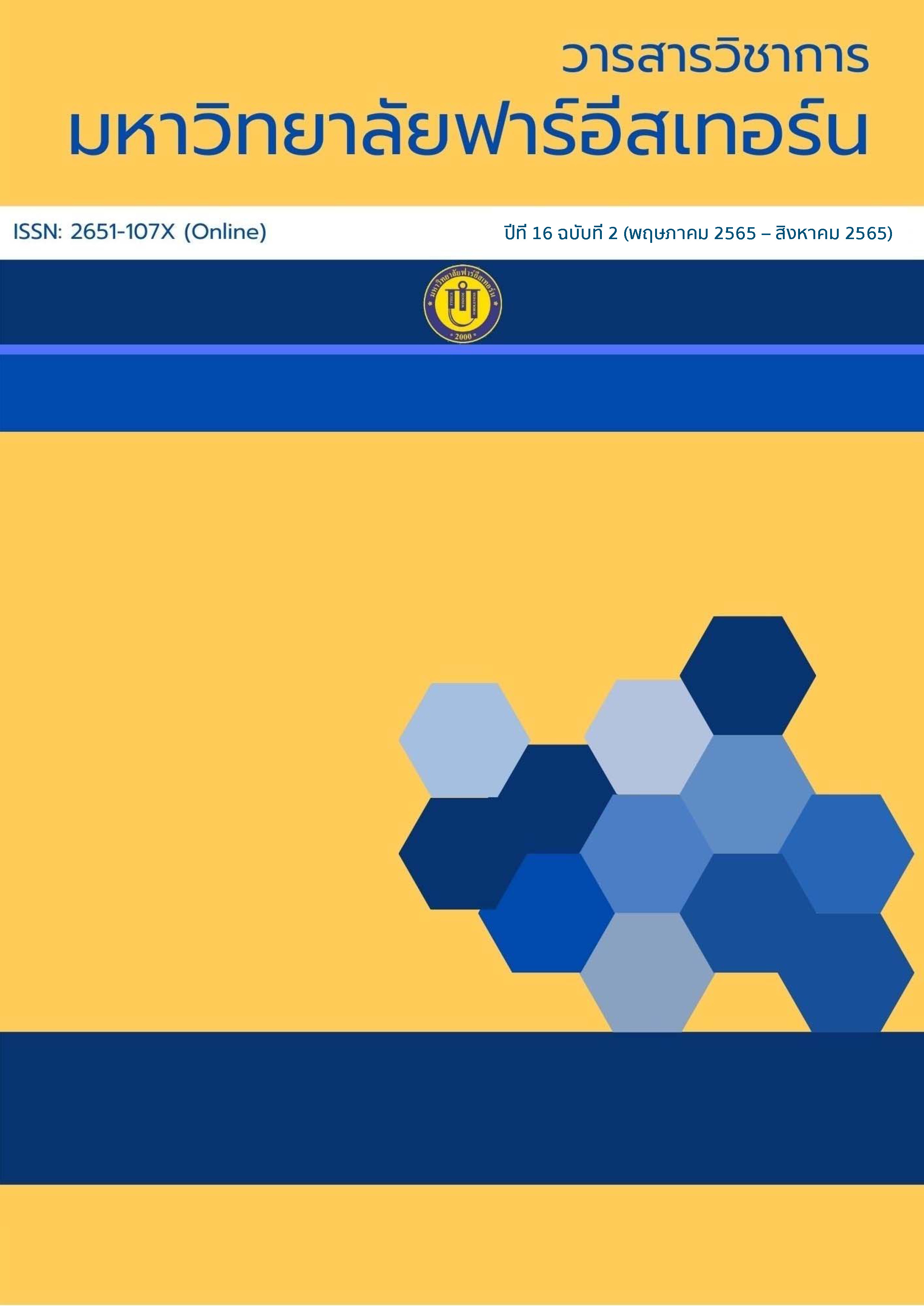Technology Leadership of School Administrators affects to the administration in Digital Age at The Secondary Educational Service Area Office Bangkok 2 in Benjawirot district, Thailand
Main Article Content
Abstract
The objectives of this research were 1) To study the level of leadership in information technology of educational institution administrators, 2) To study the results of administration in the digital age of administrators, 3) To study the factors of information technology in educational institute administrators affecting to the digital era management at the Secondary Educational Service Area Office Bangkok 2 in Benjawirot District. The samples of this were 214 teachers from the Secondary Educational Service Area Office Bangkok 2 in Benjawirot Distric and they are obtained from the stratified random sampling. The tool is a questionnaire with 5-level of estimation scale and IOC value between 0.6-1.0 and reliability 0.92. This study was analyzed using frequency, percentage, arithmetic mean. Standard deviation and content analysis. The results found that 1. The level of leadership in information technology administrators overall was high 2. The Management results in the digital age of administrators overall was high. 3. The factors of Information technology administrators of school in all fields can predict the outcome of educational administration in the digital era at the Secondary Educational Service Area Office Bangkok 2 in Benjawirot District statistically significant at the 0.05 level, with the explanation of 30.7%
Article Details

This work is licensed under a Creative Commons Attribution-NonCommercial-NoDerivatives 4.0 International License.
1. Any views and comments in the Journal of Social Innovation and Lifelong Learning are the authors’ views. The editorial staff have not to agree with those views and it is not considered as the editorial’s responsibility.
2. The responsibility of content and draft check of each article belongs to each author. In case, there is any lawsuit about copyright infringement. It is considered as the authors’ sole responsibility.
3. The article copyright belonging to the authors and The Far Eastern University are copyrighted legally. Republication must be received direct permission from the authors and The Far Eastern University in written form.
References
เจษฎา ชวนะไพศาล. (2563). แนวทางการพัฒนาความเป็นผู้นำเชิงเทคโนโลยีของผู้บริหารสถานศึกษากลุ่ม สหวิทยาเขตทวารวดี สังกัดสำนักงานเขตพื้นที่การศึกษามัธยมศึกษาสุพรรณบุรี [การค้นคว้าอิสระปริญญามหาบัณฑิต, มหาวิทยาลัยศิลปากร]. DSpace at Silpakorn University. http://ithesis-ir.su.ac.th/dspace/bitstream/123456789/3304/1/61252310.pdf
ณัฐวุฒิ พงษ์ศิริ. (2560). ผู้นำที่เรียกว่า Digital Leader ในยุคเศรษฐกิจดิจิทัล. HR Society Magazine, 15 (172), 20-23.
ดวงเดือน ตั้งประเสริฐ. (2557). การศึกษาปัจจัยที่มีอิทธิพลต่อภาวะผู้นำเชิงเทคโนโลยีสารสนเทศและการสื่อสารของผู้บริหารสถานศึกษาขั้นพื้นฐานระดับมัธยมศึกษา ในจังหวัดนครราชสีมา [วิทยานิพนธ์ปริญญามหาบัณฑิต, มหาวิทยาลัยราชภัฏนครราชสีมา]. ระบบคลังข้อมูลทางวิชาการ BRU. https://dspace.bru.ac.th/xmlui/handle/123456789/2492
ทินกร บัวชู และ ทิพภาพร บัวชู. (2562). ภาวะผู้นำดิจิทัลของผู้บริหารสถานศึกษา The Status of Digital Leadership of Education Management Administrators. วารสารครุศาสตร์สาร, 13(2), 285-294. https://edujournal.bsru.ac.th/publishes/12/articles/245
ธนกฤต พราหมน์นก. (2559). รูปแบบภาวะผู้นำเชิงเทคโนโลยีของผู้บริหารโรงเรียนมัธยมศึกษา สังกัดสำนักงานคณะกรรมการการศึกษาขั้นพื้นฐาน กระทรวงศึกษาธิการ. [วิทยานิพนธ์ปริญญาดุษฎีบัณฑิต, มหาวิทยาลัยบูรพา]. http://digital_collect.lib.buu.ac.th/dcms/files/54820007.pdf
บรรจบ บุญจันทร์. (2554). โมเดลสมการโครงสร้างภาวะผู้นำเชิงเทคโนโลยีของผู้บริหารสถานศึกษาขั้นพื้นฐาน. [วิทยานิพนธ์ปริญญาดุษฎีบัณฑิต, มหาวิทยาลัยขอนแก่น]. http://phd.mbuisc.ac.th/KKU_Thesis/A_Bunchob.doc
ปกรณ์ ลี้สกุล. (2561, 26 กันยายน). Leadership in Digital Era: ภาวะผู้นำในโลกดิจิทัล. https://aj-pakornleesakul.medium.com/leadership-in-digital-era-ภาวะผู้นำในโลกดิจิทัล-5f66d3a5b3fe
รัตติกรณ์ จงวิศาล. (2559). ภาวะผู้นำ: ทฤษฎี การวิจัย และแนวทางสู่การพัฒนา (พิมพ์ครั้งที่ 3). สำนักพิมพ์แห่งจุฬาลงกรณ์มหาวิทยาลัย.
เลอศักดิ์ ตามา และ สุมาลี ศรีพุทธรินทร์. (2563). ภาวะผู้นำยุคดิจิทัลของผู้บริหารสถานศึกษาที่ส่งผลต่อการดำเนินงานระบบประกันคุณภาพการศึกษาของสถานศึกษาสังกัดสำนักงานเขตพื้นที่การศึกษามัธยมศึกษา เขต 22. วารสารรัชต์ภาคย์, 15(38), 224-240. https://so05.tci-thaijo.org/index.php/RJPJ/article/view/248088
วิโรจน์ สารรัตนะ. (2561). โรงเรียน: องค์การแห่งการเรียนรู้ กรอบแนวคิดเชิงทฤษฎีทางการบริหารการศึกษา. อักษราการพิมพ์.
สมศักดิ์ ดลประสิทธิ์. (2564). แนวทางการจัดการศึกษาเพื่อพัฒนากำลังคนในศตวรรษที่ 21. คุรุสภาวิทยาจารย์, 2(1), 1-15. https://ph02.tci- thaijo.org/index.php/withayajarnjournal/article/view/243655
สํานักงานปลัดกระทรวงศึกษาธิการ. (2559). แผนพัฒนาการศึกษาของกระทรวงศึกษาธิการ ฉบับที่ 12 (พ.ศ.2560-2564). กรุงเทพฯ: สํานักนโยบายและยุทธศาสตร สํานักงานปลัดกระทรวงศึกษาธิการ.
สุกัญญา แช่มช้อย. (2558). ภาวะผู้นำทางเทคโนโลยี: การนำเทคโนโลยีสู่ห้องเรียนและโรงเรียนในศตวรรษที่ 21. วารสารศึกษาศาสตร์ มหาวิทยาลัยนเรศวร, 7(14), 216-224. https://so06.tci-thaijo.org/index.php/edujournal_nu/article/view/43757/36198
สุชญา โกมลวานิช และ สิทธิชัย สอนสุภี. (2561). องค์ประกอบของภาวะผู้นำดิจิทัลของผู้บริหารสถานศึกษา สังกัดสำนักงานเขตพื้นที่การศึกษา มัธยมศึกษาเขต 23. การประชุมวิชาการเสนอผลงานวิจัยระดับบัณฑิตศึกษาแห่งชาติ ครั้งที่ 21, 700-708. ขอนแก่น, ประเทศไทย. https://app.gs.kku.ac.th/images/img/support/grc2020/pdfabstracts//HMO16.pdf
สุนันทา สมใจ. (2561). การบริหารสถานศึกษาด้วยภาวะผู้นำทางเทคโนโลยี. วารสารวิทยาลัยดุสิตธานี, 12(1), 350-363. https://dtc.ac.th/wp-content/uploads/2019/04/21.-การบริหารสถานศึกษาด้วยภาวะผู้นำทางเทคโนโลยี. -โดย-สุนันทา-สมใจ..pdf
เสาวลักษณ์ พันธบุตร. (2560). อยู่อย่างคนร่วมสมัยในยุคดิจิทัล. วารสารวิชาการนวัตกรรมสื่อสารสังคม, 5(2), 161-167. http://ejournals.swu.ac.th/index.php/jcosci/article/view/9990
เอกชัย กี่สุขพันธ์. (2561). การบริหาร: ทักษะและการปฏิบัติ. รุ่งเรืองสาส์นการพิมพ์.
Best, W. J. (1981). Research in Education (4th ed.). Prentice – Hall Inc.
ISTE. (2019). ISTE National Educational Technology Standards (NETS) and Performance Indicators for Administrators. https://id.iste.org/docs/pdfs/nets-for-administrators-2002_en.pdf?sfvrsn=2
ISTE. (2019). ISTE Standards for Administrators. https://id.iste.org/docs/pdfs/20-14_ISTE_Standards-A_PDF.pdf
Narbona, J. (2016). Digital leadership, Twitter and Pope Francis. Church, Communication and Culture, 1(1), 90-109. https://doi.org/10.1080/23753234.2016.1181307
Sheninger, E. C. (2014). Digital leadership: Changing paradigms for changing times. USA: CorwinNarbonac.

